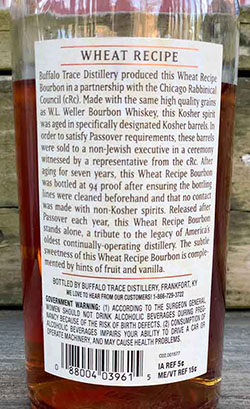Passover is here and soon Buffalo Trace will release its annual trio of Kosher whiskey. To quote Buffalo Trace, “Buffalo Trace Distillery produced this Wheat Recipe Bourbon in a partnership with the Chicago Rabbinical Council (cRc). Made with the same grains as Weller Bourbon, this Kosher spirit was aged in specifically designated Kosher barrels. In order to satisfy Passover requirements, these barrels were sold to a non-Jewish executive in a ceremony witnessed by a representative from the cRc. After aging for seven years, this Wheat Recipe Bourbon was bottled…after ensuring the bottling lines were cleaned beforehand and that no contact was made with non-Kosher spirits. Kosher Wheat is one of three expressions that are released annually to meet Kosher requirements after Passover”.
Buffalo Trace releases these bottles soon after Passover because they contain grains that are forbidden during Passover such as wheat, rye and barley. While corn (when harvested fully mature) is considered a grain, it is not (chametz) one of the 5 forbidden grains during Passover (wheat, rye, barley, oats and spelt). Since its first release a few years ago, Buffalo Trace says, “The Kosher trio has been very successful. Not only to the Jewish community, but to a broader audience who sees a Kosher label being synonymous with high standards of quality and cleanliness”.
Kitniyot is OK
Though rice, beans and corn (kitniyot) are not technically forbidden, it was prohibited about 700 years ago by Rabbis in France. The concerns being chametz was grown very closely to kitniyot and the two were hard to tell apart, and could be accidentally mixed. This tradition was carried on by European (Ashkenazi) Jews. As it turns out, Jews from North Africa and Middle East (Sephardic) were eating rice, beans, lentil and later corn for centuries during Passover the whole time. Creating a formal rule for kitniyot during Passover has been a popular reform talking point for decades. As far back 1989 the Israel’s Conservative movement approved Kitniyot to be served during Passover. In November of 2015 the International Rabbinical Assembly set a new ruling that allowed Kitniyot at the Passover table. I suppose if Buffalo Trace (or other distillery) really wanted to create a Kosher whiskey that can be served during Passover, it could be accomplished by using a mash bill of 100% corn and perhaps finish it in kosher wine barrels.
The Review
Kosher Wheat Recipe is a 7 year 94 proof bourbon that falls between the 90 proof Weller Special Reserve and the 107 proof, Weller Antique (not counting the 95 proof Weller C.Y.P.B. and the 97 proof Weller Single Barrel limited expressions). Depending where you live, this bottle could be hard to find. Thankfully it’s not part of the Weller lineup, which is why it doesn’t seem to be as hyped and vary as wildly in price. A Buffalo Trace press release from a few years ago lists the retail at $40, but other recent sources say between $45 and $50. Last year I found Kosher Wheat close to retail in NYC but some of my local’s further upstate are asking up to $90. You don’t want to know what they charge for Weller. Let’s get to it.

Taken: Neat in a Glencairn glass, rested about 10 minutes.
Distillery: Buffalo Trace Distillery.
Proof: 94.
Age: 7 Years.
Batch year: 2022
Mash bill: Speculated to be 70% corn, 16% wheat and 14% malted barley.
Retail price: Between $40-$50.
Appearance: Golden caramel.
Nose
Sweet caramel, peaches, baked apple, strawberries, orange, vanilla bean, cloves, wheat bread, subtle baking spice. This batch is very well blended with some very nice oak. This nose is like a sweet fruity delicious wheat cake with vanilla frosting.
Palate
Medium viscous mouthfeel. Nose transfers to palate with caramel, peaches, berries, orange peel, vanilla, cloves and oak. Subtle baking spice enters the sip and does a nice job covering the palate. This is a very delicious fruit forward and incredibly easy sipper that offers a lot of flavor for its 94 proof.
Finish
Baking spice lingers with caramel, stone fruit, berries and cloves. Oak turns into subtle tannins of leather towards the end of the sip for a medium long finish.
Short BTKW to Weller Bar Pour Comparison
Weller Special Reserve (WSR) – WSR has a similar flavor profile on the nose but is more subdued. The mouthfeel is thinner and the palate tastes much more watered down, despite being only 4 points lower in proof. Shorter finish.
Antique 107 (OWA) – OWA is much bolder on the nose and palate with more oak, caramel, and spice. It’s not as sweet and has less fruit and vanilla than BTKW. OWA has a much stronger finish. I was expecting OWA to be like an elevated BTKW, but that’s not quite what I got. Although OWA’s elevated profile is more up my alley with bolder flavors with richer caramel and oak, I missed the amount of fruit and vanillin’s found in BTKW. I was surprised that there are aspects of each that I loved over the other.
Conclusion
Buffalo Trace Kosher Weller umm… cough, cough, excuse me. I mean…Wheat Recipe is a very good bourbon that held its own against its 13 point higher proof Weller cousin. I’m glad it carries a Buffalo Trace label or else it probably wouldn’t have been on the shelf the day I purchased it, and would have been priced even higher. Though it’s not my favorite wheated bourbon, it hits the spot when I’m in the mood for a very delicious, easy going dessert pour. I’d buy it again if I can find it close to retail.
Rating: 6.4/10.
1 | Disgusting | So bad I poured it out.
2 | Poor | I wouldn’t consume by choice.
3 | Bad | Multiple flaws.
4 | Sub-par | Not bad, but better exists.
5 | Good | Good, just fine.
6 | Very Good | A cut above.
7 | Great | Well above average.
8 | Excellent | Really quite exceptional.
9 | Incredible | An all time favorite.
10 | Perfect | Perfect.



